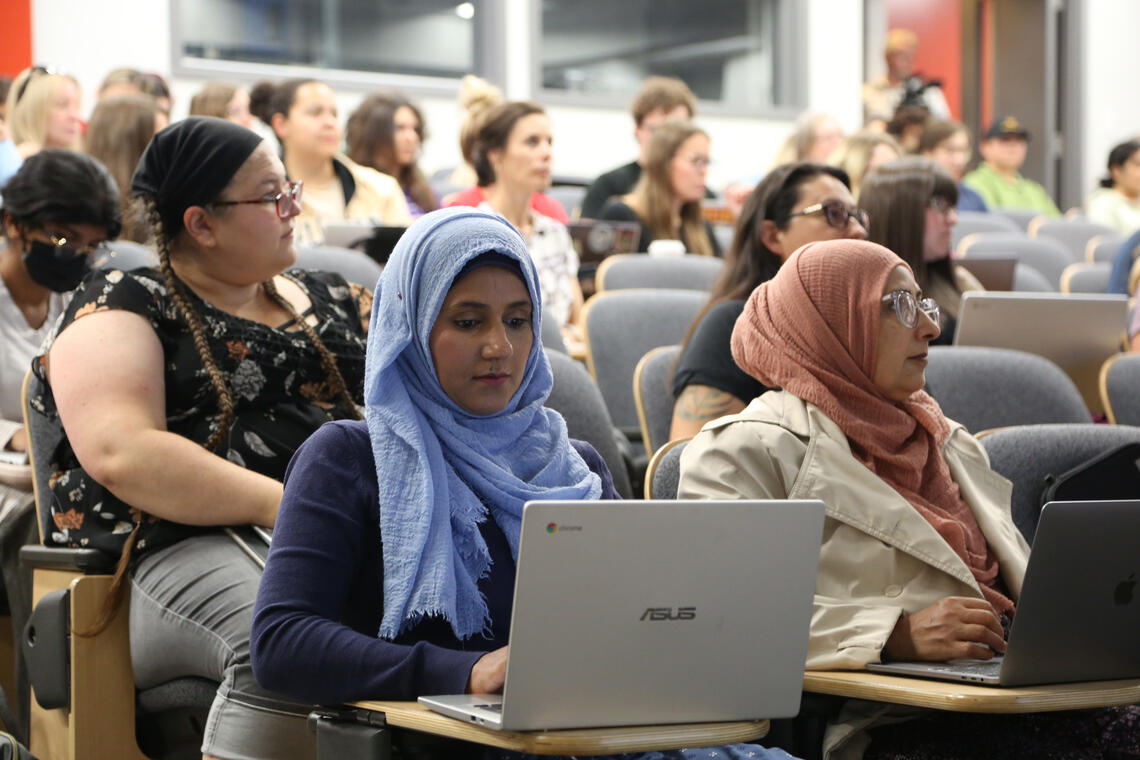Nov. 27, 2023
Werklund School of Education and Northern Lakes College address rural and remote teacher shortage

An initiative that allows students from Northern Lakes College (NLC) to transfer courses toward a Bachelor of Education degree through the Werklund School of Education is making dreams come true.
One student, Athena Williams, says she always wanted to be a teacher, but several years of high-flying adventure veered her so far off course that she feared she missed her chance. Originally from Red Deer, Williams and her husband, Marc, heeded the call of the north, moving first to Nunavut, then to Canyon Creek, a hamlet 25 kilometres west of Slave Lake in north-central Alberta.
For a spell both worked in aviation — Athena as a flight instructor and her husband as a Medevac aircraft maintenance engineer. But then a quite different sort of life adventure, motherhood, grounded Williams as she chose to dedicate herself to raising her children full time.
“I always thought, you know, I'll fly for a while, and then I'll go back to school and be a teacher later on in my adult life,” she says. “One of my first thoughts when we moved [near Slave Lake] was, ‘That's never going to happen for me,’ you know? I can't uproot my family to go to the city. My husband's got a good job here — it's just not going to happen.”
Fate — not to mention a well-timed partnership — intervened in 2019 as Werklund and NLC formalized their BEd transfer program agreement through which NLC University Studies students complete most of their program requirements via online courses with NLC, plus a two-week residency at the University of Calgary for each year of their program.
One day that fall, Williams was dropping off her kids at their swimming lessons — which just so happened to be at the Northern Lakes College Slave Lake Campus — when she came across an advertisement for the program.
“I thought, ‘Oh, my goodness, this could be my chance to fulfill my dreams — it might be possible,” says Williams.
Now entering her third year, Williams is just a step away from realizing her ambitions, something she says never would have happened without this kind of community-based programming.
“I couldn't uproot the kids and move to the city, and I couldn't leave — I would miss out on their childhood going to school in the city for four years,” she says. “So that's how I ended up here, and I'm so thankful that it's possible with this program.”
Serving students where they’re at
Addressing issues of access and equity and finding real-world solutions to the teacher shortage crisis in rural and northern communities underpins the Werklund School of Education’s commitment to community-based learning. Dr. Amy Burns, Werklund’s associate dean of undergraduate programs, says remote communities often rely on attracting out-of-province teachers through incentive programs, but these are usually a short-term fix at best, as individuals tend to stay in these roles for only a couple of years at a time.
“What we've gone to now is this concept of ‘grow your own teacher,’ which means, take those people in your community who have a connection to the people and to the land and who are invested in the community, and find a way for them to do a Bachelor of Education that isn't going to uproot their entire lives,” say Burns.
Northern students will continue to have the opportunity to study in their home community and earn a BEd thanks to the renewal of the Werklund/NLC partnership for an additional five years, effective upon conclusion of the initial terms of the transfer agreement next year.
Dr. Michelle Mitchell, dean of health, human services and university studies at Northern Lakes College, says the program has been making a considerable impact, with students getting scooped up for teaching positions upon graduation — if not beforehand, as many are landing educational assistant jobs through their practicum placements.
“When I talk to principals, I hear wonderful things about our graduates. They're telling me that the community-based graduates are coming with the skills that they want them to have,” she says. “We are are hurting for teachers in the North, so having a pool of teachers that are local is a game-changer for the schools, I believe. I hope that we can continue to produce more and more graduates here and keep helping to fill that void.”

Community-based learning students come to UCalgary for an intensive two-week summer residency as part of their program.
Zoltan Varadi
Remote connection
For her part, Athena Williams says the annual two-week summer residency at the Werklund School of Education is a highlight of the program. She credits both UCalgary and Northern Lakes College for making remote students feel connected year-round.
“The University of Calgary does a very good job of making us feel like we're very much still part of the community even though we're physically separated from it,” she says. “Northern Lakes College is in constant communication as well. We're very much a community, despite being physically or geographically separated.”
“The summer residency brings it all together for me each year,” she continues. “The connections I've made with people from all over Alberta, it's so cool because we bring such diverse experiences, and we're all from different communities, some are rural, some are urban, some are from Indigenous communities, and to bring all that experience into one place for two weeks — we learn so much from each other.
“We have incredible teachers on their way all over Alberta, I think.”
Learn more about Werklund's Community-based Learning options, which includes a four-year Bachelor of Education program and a two-year Bachelor of Education after-degree.





